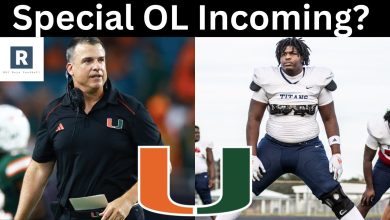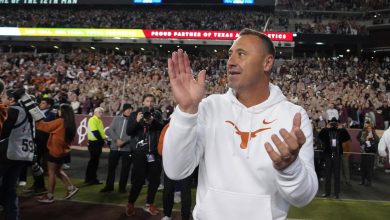Nico Iamaleava, the quarterback for the Tennessee Vols, was belittled for depending too much on Josh Heupel’s scheme.

Nico Iamaleava, the highly touted quarterback for the Tennessee Volunteers, entered the 2024 season with immense expectations placed on his shoulders. A five-star recruit out of high school, Iamaleava was expected to be the centerpiece of Tennessee’s offense under head coach Josh Heupel, whose fast-paced, high-scoring offensive system has taken the college football world by storm. However, despite his considerable talent, Iamaleava has faced criticism for allegedly relying too heavily on Heupel’s scheme rather than showcasing the full breadth of his own abilities.
This criticism, which emerged throughout the season, has raised questions about whether Iamaleava has been able to carve out his own identity as a quarterback or if he’s merely a cog in a well-oiled machine. To understand this dynamic, it’s important to delve into the context of Tennessee’s offensive system, the expectations placed on Iamaleava as a young quarterback, and the criticisms he faced regarding his play in 2024.
Josh Heupel’s Offensive Scheme: A System That Demands Speed and Efficiency
Before diving into the conversation about Iamaleava’s development, it’s essential to first understand the offensive system that Tennessee runs under Josh Heupel. Known for his high-octane, up-tempo attack, Heupel has revolutionized Tennessee’s offense since taking over as head coach in 2021. His scheme is designed to maximize explosive plays by using speed, spacing, and tempo to stretch defenses thin. The idea is to put constant pressure on opposing defensive coordinators by executing quick-hitting plays that force defenders to react faster than they can think.
The offensive strategy is built around a no-huddle, fast-paced approach that pushes the pace of the game. Heupel has instilled in his quarterbacks the necessity of quick decision-making, reading defenses on the fly, and delivering accurate passes to open receivers. In such a system, timing and rhythm are paramount. The quarterback is expected to keep the ball moving and ensure that the offense never stalls. This philosophy has led Tennessee to immense success, with the Vols regularly ranking among the top teams in the country in offensive production.
For Iamaleava, a young quarterback stepping into such a system, there are both advantages and challenges. The fast tempo can mask a quarterback’s weaknesses, as there is less time for defenses to react. However, it also places significant pressure on the quarterback to make quick decisions and execute with precision. This is where the criticism that Iamaleava is overly dependent on Heupel’s scheme begins to take shape.
The Pressure of High Expectations
Nico Iamaleava was not just any freshman quarterback entering the 2024 season. He was a five-star recruit, one of the top-ranked quarterbacks in the nation, and a highly coveted talent who had been courted by some of the most prestigious programs in college football. As a result, he was expected to step in and make an immediate impact for Tennessee, leading the offense to new heights.
From the moment Iamaleava committed to Tennessee, fans, analysts, and pundits alike began comparing him to some of the top quarterbacks in college football. The comparisons to former greats like Peyton Manning, who also wore the Tennessee orange, further amplified the weight of expectations. With such lofty comparisons, the pressure on Iamaleava to deliver was immense.
Despite his natural talent, Iamaleava was still learning the nuances of Heupel’s offense, a system that demands a specific style of play. In his early outings, Iamaleava showed flashes of brilliance. His arm strength, mobility, and ability to make plays on the run were evident. However, there were also moments where he seemed to struggle with the fast pace of the offense, missing open receivers or failing to read defenses as effectively as expected. This inconsistency led to criticisms that he was relying too much on the structure of Heupel’s scheme rather than showcasing his own football IQ and ability to improvise.
The Criticism: “A Product of the System”
As the 2024 season progressed, the whispers about Iamaleava’s reliance on Heupel’s scheme grew louder. Critics began to question whether Iamaleava was truly an elite quarterback or if he was merely a product of an offensive system that made it easier for him to succeed. This line of thinking suggested that Iamaleava’s success was more about Heupel’s fast-paced offense and the talent surrounding him than it was about his own individual skills.
One of the primary criticisms leveled against Iamaleava was his perceived lack of ability to make plays outside of the structure of the offense. Under Heupel’s system, much of the offense relies on timing and precision, with quarterbacks tasked with quickly identifying mismatches and delivering the ball in rhythm. However, when the offense wasn’t firing on all cylinders, or when defenses were able to slow down the tempo, Iamaleava seemed to struggle.
This led to questions about his ability to read complex defenses or adjust to changes on the fly. In a high-pressure situation, when the offense needed a spark or the game was on the line, Iamaleava sometimes appeared hesitant, relying on the structure of the offense rather than improvising or taking risks. The critique became that he was “too scripted” and lacked the kind of creativity and adaptability that some of the top quarterbacks in college football are known for.
Critics argued that while Iamaleava certainly had talent, his success was largely due to the system around him. The high tempo and spaced-out nature of Heupel’s offense allowed for plenty of opportunities to succeed without having to make complex, off-script decisions. In a way, some believed that Iamaleava wasn’t being asked to be a traditional quarterback who would lead a team in difficult situations; instead, he was thriving in a scheme that made things easier for him.
The Debate: System vs. Quarterback Play
The question of whether Iamaleava is a product of the system is not unique to him. Over the years, many quarterbacks in college football have faced similar criticisms, particularly those who play in high-tempo, pass-heavy offenses. A classic example is the debate over quarterbacks in spread systems, where the line between what’s attributed to the quarterback’s individual talent versus the system’s influence is often blurred.
However, it’s important to recognize that Iamaleava is still in the developmental stages of his college career. The 2024 season was just his first year as the starting quarterback, and it’s natural for a young player to be more reliant on the structure of the offense as he becomes accustomed to the speed and complexity of the game. It’s also worth noting that while Heupel’s system is designed to make things easier for quarterbacks, it doesn’t guarantee success. The system requires quarterbacks to have quick decision-making skills, precision, and the ability to read defenses on the fly.
In many ways, Iamaleava’s reliance on the system is not a sign of weakness but rather a natural part of his growth as a quarterback. As he continues to gain experience, it’s likely that he will become more comfortable with the nuances of the offense and develop the ability to make plays outside of the scheme when necessary.
The Future of Nico Iamaleava
Despite the criticism, the future of Nico Iamaleava remains incredibly bright. His raw talent—his arm strength, athleticism, and physical tools—are undeniable. The question moving forward is how he will develop as a quarterback and whether he can refine his skills to become a more complete player who can thrive in a variety of situations.
As Iamaleava gains more experience under Heupel’s system, it’s likely that he will develop a better understanding of when to stick to the script and when to take risks. With more time, he’ll learn how to read defenses more effectively and adjust his approach when the game slows down. The true test will come in close games and high-pressure situations when he’ll need to make critical decisions without the luxury of relying entirely on the structure of the offense.
Furthermore, Heupel himself is a coach who understands the value of player development. While his offense is high-paced and designed to score points quickly, he is also known for helping quarterbacks refine their decision-making and improve their overall football IQ. This could bode well for Iamaleava’s growth as he continues to develop under Heupel’s tutelage.









